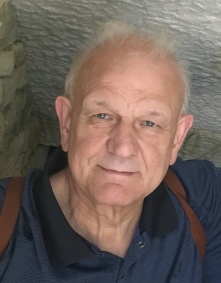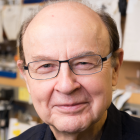
Master Switches of the Mind: Gene Regulation and Neurodevelopmental Disorders
April 24–25, 2026 | UB North Campus
The College of Arts and Sciences Spotlight Symposia Series recognizes and elevates members of our faculty. Each Spotlight symposium honors a particular faculty member by inviting distinguished speakers to our campus who share the honoree’s research field. The symposium places our honoree at the center of vital national and international conversations and serves as an important venue for building scholarly relationships critical to the university.
Learn about:
Admission is free; registration is required by April 10.
About Soo-Kyung Lee, PhD
Empire Innovation Professor
Om P. Bahl Endowed Professor of Biological Sciences
Director of the UB FOXG1 Research Center
Soo-Kyung Lee’s research aims to dissect gene regulatory events that lead to cellular diversity and, eventually, the formation of functional neural circuits in the central nervous system and to understand the genetic and mechanistic basis for neurodevelopmental defects, ultimately contributing to the generation of better treatment strategies for human developmental disorders.
Research News
- UB researchers’ FOXG1 drug cleared for clinical trials
- Based on ‘hope and love,’ UB celebrates opening of FOXG1 Research Center
- UB launches center to find treatments for FOXG1 syndrome
- Study suggests promising gene therapy for FOXG1 syndrome
- SFARI supports Soo-Kyung Lee's research on FOXG1 Syndrome
- How motor neurons develop into subtypes that activate different muscles
- New York Times article on the Lee’s journey with FOXG1 syndrome
Friday, April 24
Reception, Keynote and Performance
2:45–5 p.m. | Slee Hall, UB North Campus
Saturday, April 25
Honoree and Technical Talks with a Poster Session
8:30 a.m.–5 p.m. | Natural Sciences Complex, UB North Campus
Continental breakfast and lunch included
5–7 p.m. Wine and Cheese Reception | Bulls on the Run Corner Cafe
Natural Sciences Complex
Admission is free; registration is required by April 10.
Keynote Speaker
Hugo J. Bellen, DVM, PhD
Distinguished Service Professor
Departments of Molecular and Human Genetics
Baylor College of Medicine
The study of rare pediatric neurological diseases drives discoveries in common diseases
About the Keynote Speaker
Hugo Bellen is a Distinguished Service Professor at Baylor College of Medicine (BCM) in the Departments of Molecular and Human Genetics and Neuroscience. Originally from Belgium, Bellen earned a degree in Business Engineering from the Solvay School of Business at the University of Brussels, a Pre-Veterinary Medicine degree from the University of Antwerp and a doctoral degree in Veterinary Medicine from the University of Ghent. He received his PhD in Genetics from the University of California at Davis and completed postdoctoral research in the laboratory of Walter Gehring at the University of Basel in Switzerland. He was an HHMI Investigator at BCM from 1989-2021 and joined the Neurological Research Institute at Texas Children's Hospital at its inception in 2011.

One of the world's premier researchers in Drosophila (fruit fly) genetics, Bellen's group made major contributions to our understanding of nervous system development, synaptic transmission and mechanisms of neurodegeneration. As the head of the Drosophila Gene Disruption Project, his laboratory has developed numerous sophisticated genetic tools and generated tens of thousands of reagents that have transformed Drosophila biology.
Bellen's current research focuses on the discovery of new human disease genes and elucidating pathogenic mechanisms of neurodevelopmental and neurodegenerative diseases using fruit flies in collaborations with human geneticists worldwide. His lab is the home of the Model Organism Screening Center for the Undiagnosed Diseases Network of the National Institutes of Health. In the past few years, he has made major strides in solving key problems related to Alzheimer disease, Amyotrophic Lateral Sclerosis, Parkinson disease and Multiple Sclerosis.
Bellen has trained 41 graduate students, including seven MSTP students and 53 postdoctoral fellows who are successful in careers in academia and industry. Currently, 16 trainees are in the lab, including a mix of technicians, graduate students and postdoctoral fellows. Bellen served as the Director of the BCM Graduate Program in Developmental Biology for more than 20 years. Bellen received the Dean's Faculty Award for Excellence in Graduate Education from BCM, the Presidential Award for Excellence in Leadership in Science and Research mentoring in 2018, the Barbara and Corbin J. Robertson, Jr. Presidential Award for Education and Mentoring in 2021 and the Arthur L. Beaudet Mentoring Award, in 2022.
Bellen is a member of the editorial boards of eLife, PNAS and Genetics. He is the chair of the scientific advisory board of the Bloomington Drosophila Stock Center and is a member of the scientific advisory boards of FlyBase, the Gill Center for Biomolecular Science and the INADcure Foundation. He was previously on the scientific advisory boards of the Max Planck Institute in Göttingen, Germany, the Academia Sinica in Taipei, Taiwan, the KAIST in Daejeon, Korea and the VIB in Leuven, Belgium.
Bellen's awards include the Gruber Prize in Genetics, the George Beadle Award from the Genetics Society of America, the Linda and Jack Gill Distinguished Neuroscience Investigator Award from Indiana University, the Miegunyah Distinguished Visiting Fellowship from the University of Melbourne, the Distinguished Alumnus Award from the University of California, Davis and the Michael E. DeBakey, MD, Excellence in Research Award. He is the March of Dimes Professor in Developmental Biology, the Charles Darwin Professor in Genetics at Baylor College of Medicine and the endowed Chair of the Neurological Research Institute of Texas Children’s Hospital. He is an elected member of EMBO, the American Academy of Arts and Sciences and a member of the National Academy of Sciences.
Musical Performance
Composer and performer Sungmin Shin, associate professor of practice in the Department of Music, explores a wide range of styles, genres and idioms, which is a culmination of the immigrant experience. The core theme of this album deals with identity and authenticity as an Asian American performing artist living in the United States through the lens of the guitar. “Generation One” consists of all newly composed music for the solo guitar including works for the classical and electric guitars. This genre bending program lives without borders and draws from Brahms to Debussy, King Crimson to Steve Reich, Jobim to Villa-Lobos, Seo Taiji to Stevie Wonder and more.

Technical Talks

Benjamin Deneen, PhD
Professor and Dr. Russell J. and Marian K.
Blattner Chair,
Baylor College of Medicine
Astrocyte Regulation of Brain Circuits

Gord Fishell, PhD
Professor, Department of Neurobiology,
Harvard Medical School
Pyramidal Neurons Alter the Survival and Connectivity of Somatostatin Cortical Interneuron

David D. Moore, PhD
Robert C. and Veronica Atkins Professor and Chair, Department of Nutritional Sciences and Toxicology,
University of California, Berkeley
Transcriptional and post-transcriptional regulation of nutrient response in the liver
Benjamin Deneen, PhD, completed his undergraduate studies in Genetics at University of California Davis and focused his graduate studies at UCLA on Cancer Biology, studying pediatric sarcoma. Switching gears for his post-doctoral fellowship, Deneen studied Developmental Neuroscience at the California Institute of Technology.
In 2009, he started his laboratory at the Baylor College of Medicine in the Center for Cell and Gene Therapy and Department of Neuroscience. Over the past 17 years, Deneen’s lab has made seminal contributions to our understanding of glial development, glial control of brain circuit function, and the neuroscience of brain tumors.
In 2021, he founded the Center for Cancer Neuroscience, where he leads a multi-disciplinary program focused on understanding how brain tumors interact with neurons and the tumor ecosystem, while leveraging these insights to find new therapies. Basic discoveries from these efforts have launched several, cancer neuroscience-informed clinical trials.
Gord Fishell, PhD, is recognized for his work on the generation of cortical interneurons and for understanding their contribution to cortical development and function. Gord’s seminal discoveries concerning the interneuron properties both in normal brain development, as well as their involvement in neuropsychiatric diseases have allowed him to understand both their development and how they can be targeted and manipulated in less genetically amenable species, such as humans. His work has emphasized that cortical interneuron development combines early genetic programs imbued on interneurons at birth and modulated by the circuits they integrate into in the cortex. His work also emphasizes that development and circuit function are intimately connected in normal brain, as well as in dysfunction in disease.
Gord is a pioneer in the use of molecular genetic approaches to decipher the development, organization and function of cortical interneurons. His studies have provided fundamental understanding of the origins, genetic identities and physiological properties of cortical interneurons and how they are established in development.
His laboratory has worked to understand the inhibitory cells that regulate excitatory signaling in the brain. In its simplest sense, brain inhibition is the stop signal that prevents the brain from becoming over-excited. In practice it is much more nuanced.
Gord’s scientific contributions have been recognized in many ways, including giving the presidential lecture at the Society for Neuroscience (SFN) in 2014, a Harvey lecture in 2022, and election to the National Academy of Sciences in 2023.
David D. Moore, PhD, is the Robert C. and Veronica Atkins Professor and Chair of the Department of Nutritional Sciences and Toxicology at the University of California, Berkeley.
The focus of the Moore laboratory is the nuclear hormone receptor superfamily, particularly orphan and former orphan receptors with important regulatory functions in the areas of metabolism and cancer. He has authored more than 200 original research reports and has been awarded 11 patents on various technologies related to nuclear hormone receptors. He has received the Edwin B. Astwood Award from the Endocrine Society, the Transatlantic Medal from the UK Society for Endocrinology, the Adolf Windaus Prize from the Falk Foundation and is a fellow of the American Association for the Advancement of Science and a member of the National Academy of Sciences.
Moore was the Robert R. P. Doherty Jr. - Welch Professor in the Department of Molecular and Cellular Biology and professor in the Departments of Medicine and Molecular and Human Genetics at the Baylor College of Medicine (BCM) until 2021. Before coming to BCM in 1997, he was an assistant and associate professor in the Department of Genetics at Harvard Medical School, as well as assistant and associate Molecular Biologist in the Department of Molecular Biology at Massachusetts General Hospital.

Samuel L. Pfaff, PhD
Professor, Gene Expression Laboratory, Benjamin H. Lewis Chair Professor in Neuroscience,
Salk Institute for Biological Studies
Unraveling spinal cord circuits and motor control: Characterizing neuronal diversity and connectivity from the view of development and evolution

Franck Polleux, PhD
Professor, Department of Neuroscience, Mortimer B. Zuckerman Mind Brain Behavior Institute,
Columbia University
Impact of human-specific genetic modifiers on cortical circuit evolution and neurodevelopmental diseases

Robert G. Roeder, PhD
Arnold and Mabel Beckman Professor,
The Rockefeller University
Functional and mechanistic studies of transcriptional co-activators
Samuel L. Pfaff, PhD, is a professor at the Salk Institute for Biological Studies and the head of the Goldman Laboratory for Neural Circuit Dynamics in the Gene Expression Laboratory. He is the Benjamin H. Lewis Chair in Neuroscience at the Salk Institute and holds appointments with the Biology, Biomedical Sciences, Neuroscience and Bioengineering programs at the University of California, San Diego. He is the recipient of the Javits Neuroscience Investigator Award, McKnight Scholar Award, PEW Scholar Award, Alfred P. Sloan Research Fellow Award and Fellow of the American Association for the Advancement of Science.
Pfaff is best known for characterizing one of the earliest examples of molecular diversification among neuronal subtypes through his analyses of the combinatorial activity of the LIM-homeodomain gene family in spinal neurons. The simple concept that genes can be used to mark specific neuronal subtypes is revolutionizing how functional studies of circuits are performed and has led to important tools for guiding the conversion of stem cells into neuron subtypes.
He received his bachelor's degree in biology from Carleton College and his doctorate in Molecular Biology from the University of California, Berkeley. His post doctoral training was completed at Vanderbilt University with William Taylor on gene regulation followed by Columbia University with Thomas Jessell on neural development.
Franck Polleux, PhD, is a professor of Neuroscience at Columbia University and a Principal Investigator at the Zuckerman Mind Brain Behavior Institute in New York.
Polleux focuses on the identification of novel cellular and molecular mechanisms underlying the development and function of synapses, neurons and circuits in the mammalian neocortex. More recently, his lab started studying the genetic basis of human brain evolution by focusing on the role of human-specific gene duplications as genetic modifiers of synaptic connectivity, circuit function and their impact on cognition. His work demonstrates that human-specific genes such as SRGAP2B/C not only represent human-specific modifiers of brain development but also represent unique human-specific disease modifiers in the context of neurodevelopmental disorders such as autism spectrum disorders. In collaboration with the lab of Attila Losonczy, he recently started to study the synaptic and molecular basis of feature selectivity of place cell emergence using mouse CA1 hippocampal pyramidal neurons as a model.
Polleux was awarded the Albert L. Lehninger Research Prize for postdoctoral research, the 2005 NARSAD Young Investigator Award, the 2015 Foundation Roger De Spoelberch Prize, a 2021 Nomis Foundation Award and the 2021 R35 Research Program Award, a career award from the NIH-National Institute of Neurological Disorders and Stroke (NINDS).
He obtained his PhD at Université Claude Bernard in Lyon France under the supervision of Henry Kennedy and Colette Dehay. He completed his postdoctoral training with Anirvan Ghosh at Johns Hopkins University. He started his independent research career at UNC-Chapel Hill, then moved to Scripps Research Institute in La Jolla, CA.
Robert G. Roeder, PhD, is the Arnold and Mabel Beckman Professor and Head of the Laboratory of Biochemistry and Molecular Biology at The Rockefeller University. For over 50 years he has pioneered biochemical studies of the mechanism and regulation of gene transcription in animal cells. He is best known for his discovery and mechanistic analyses of the nuclear enzymes (RNA polymerases I, II, III) that transcribe the three major classes of RNA ((Ribonucleic acid), cognate general initiation factors, the prototype gene-specific transcriptional activator and a variety of ubiquitous and tissue-specific transcriptional co-activators, such as the Mediator complex, that facilitate interactions between enhancers and promoters. Key features of these studies were the development of cell-free systems in which cloned genes (as DNA or recombinant chromatin templates) are accurately transcribed by purified factors as they are in the cell; and extensions to biological processes that include development, cell differentiation and cancer.
His numerous honors include the Eli Lilly Award in Biological Chemistry, the NAS-US Steel Award in Molecular Biology, the Alfred P. Sloan Prize, the Louisa Gross Horwitz Prize, the Gairdner Foundation International Award, the Albert Lasker Award in Basic Medical Research, the Salk Medal for Scientific Excellence, the Albany Medical Center Prize in Medicine and Biomedical Research, the Kyoto Prize in Basic Science and election to the National Academy of Sciences and the American Academy of Arts and Sciences.
Roeder received a bachelor’s degree from Wabash College and a doctorate in biochemistry from the University of Washington.

John L. R. Rubenstein, MD, PhD
Nina Ireland Distinguished Professor in Child Psychiatry, Professor, Department of Psychiatry,
University of California, San Francisco
Cell Fate Regulation in the Forebrain

Hongjun Song, PhD
David J. Mahoney Professor of Neurological Science
Chair of the Department of Neuroscience
University of Pennsylvania Perelman School of Medicine
Mechanisms regulating mammalian hypothalamus development
John L. R. Rubenstein, MD, PhD, is a resident physician in child psychiatry at Stanford specializing in autism. Rubenstein devised a method to identify genes that are preferentially expressed in the embryonic forebrain, which led to the discovery of the Dlx2 and Tbr1 transcription factors. These genes served as entry points for his studies at UCSF where, since 1991, has performed genetic studies of mammalian forebrain development and human neuropsychiatric disorders. Rubenstein has investigated: organization of the embryonic forebrain; forebrain patterning centers and their regulation of cortical organization; transcription factors and enhancers that control regional and cell-type specification of brain subdivisions; differentiation, migration and function of GABAergic interneurons; translational studies of treatment for epilepsy; analyses of transcription factor mutations that may contribute to autism.
Rubenstein trained eight doctoral students and over 50 postdoctoral fellows. Rubenstein has extensive mentoring experience and several trainees are now professors, including: Stewart Anderson, Sonia Garel, Robert Hevner, Juhee Jeong, Eirene Markenscoff-Papadimitriou, Oscar Marin, Matt Porteus, Lori Sussel, Daniel Vogt.
Rubenstein earned a Phi Beta Kappa as a chemistry major at Stanford. In the Medical Scientist Training Program at Stanford Rubenstein, he earned a doctorate in Biophysics for his studies on the effect of cholesterol on the motions of phospholipids in membranes as well as the biogenesis of plasma membrane proteins with Harden McConnell and James Rothman. As a postdoctoral fellow at the Pasteur Institute with Francois Jacob and J.F. Nicolas, Rubenstein was one of the discoverers that antisense RNA can inhibit gene expression.
Hongjun Song, PhD, is the Perelman Professor of Neuroscience at Perelman School of Medicine of University of Pennsylvania. The research in Song’s laboratory focuses on the development and plasticity in the mammalian nervous system, in particularly, adult neurogenesis and euroepigenetics/neuroepitranscriptomics. His laboratory also uses patient-derived stem cells and tumor cells in 2D cultures and 3D organoids to investigate human brain development and disorders.
Song has won a number of awards, including Young Investigator Award from the Society for Neuroscience (SFN), Jacob Javits Neuroscience Investigator Award and Landis Mentorship Award for Outstanding Mentorship from National Institutes of Health. He is a member of the National Academy of Medicine (NAM) and a fellow of the American Association for the Advancement of Science (AAAS).
Song received his bachelor's degree from Peking University, a master’s degree from Columbia University and a doctorate from University of California at San Diego.
The poster session will take place in the corridor of the Natural Sciences Complex. It’s an opportunity for UB students to share their work.
When registration opens, please submit your poster abstract with your registration to attend the symposium.
The deadline to register and submit poster abstracts is Wednesday, March 11. Selected posters will be announced around March 27.
Admission is free; registration is required by April 10.
A block of rooms has been held at the Fairfield Inn and Suites Buffalo Amherst/University at a rate of $126/night for attendees. The last day to take advantage of the group rate is Mar. 23, 2026.
- Yeong Shin Yim, Assistant Professor of Pharmacology, University of Pennsylvania
- Mi-Hyeon Jang, Associate Professor of Neurosurgery, Rutgers Brain Health Institute
- Michael Yu, Associate Professor of Biological Sciences, University at Buffalo
- Jae Lee, Professor of Biological Sciences, University at Buffalo
- Edward Kwon, Assistant Professor of Oral Biology, University at Buffalo
- Wei Sun, Associate Professor of Communicative Disorders and Sciences, University at Buffalo
- Derek Daniels, professor, organizing committee chair and chair of the Department of Biological Sciences
- Sambandamurthy Ganapathy, Associate Dean for Research, College of Arts and Sciences
- Hyeryeong Park, UB FOXG1 Research Center lab manager
- College Events team, College Marketing and Communications team
For more information, contact casevents@buffalo.edu.
Diana Aga, PhD, SUNY Distinguished Professor, Henry M. Woodburn Chair of Chemistry and Director of UB’s RENEW Institute was the inaugural symposia honoree. The symposia, "Convergence of Science for One Planet, One Health" addressed the world’s increasing chemical pollution and scarcity of natural resources that are exacerbated by the rapidly changing climate in a vicious, existential cycle. In order to create solutions for the fragile water-energy-food nexus, we must understand the threats we face as interlocking global sustainability challenges.

